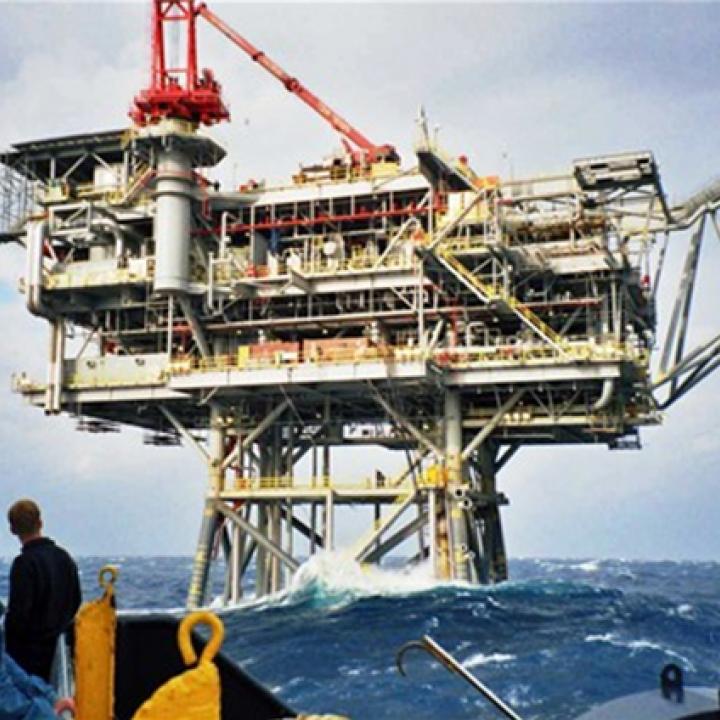
- Policy Analysis
- Policy Alert
East Mediterranean Gas Running Into Commercial, Technical, and Political Challenges

Reduced demand caused by the coronavirus and low oil/gas prices has complicated plans for further development of the region’s offshore reserves.
When a giant flare lit up the night sky off Israel’s coast on May 23, it was a reminder of the country’s natural gas riches and its persistent environmental concerns. Excess gas from a processing platform six miles offshore was ignited in what the government called an “emergency closure.” Production from the field that supplies the platform—Leviathan, located deep under the seabed seventy-five miles further west—resumed within a few hours, and the incident was later explained as a false alarm caused by a gas detector failure.
This was the second time a gas flare had to be briefly ignited at the platform since it went into operation at the end of 2019—apparently a normal procedure in startup facilities. (There have been no such visible dramas from the long-producing Tamar facility thirteen miles off the coast of Ashkelon further south, but only because, for reasons of its design, igniting excess gas would melt the platform.) Leviathan gas began pumping into the Israeli grid this January. Tamar gas already meets domestic demand, so supplies from the newer, larger field are sent through the grid and on to Egypt and Jordan.
At the moment, Egypt is using Leviathan gas strictly for its domestic market. Both Cairo and Jerusalem hope that future volumes can be exported to other foreign markets via liquefied natural gas tankers, but those plans are on hold because selling it in that form is not viable under current international prices. Low prices are also to blame for the pause in plans to expand gas production from Leviathan, which is operated by Noble Energy of Houston. Any attempt to recover oil from reservoirs beneath the gas-bearing strata seems a dream for now.
Under the present circumstances, the key customer is Jordan, which uses Israeli gas to power its electricity generating network. Yet this contract and a smaller arrangement to send Tamar gas to Jordanian industrial facilities at the Dead Sea may be endangered by upcoming political developments. Israel has announced that potential annexation moves in the West Bank could begin as soon as July, prompting sharp warnings from King Abdullah.
In the wider East Mediterranean region, initial French-led exploration for gas off the coast of Beirut earlier this year produced mere traces of hydrocarbons, while further exploration in an area closer to the disputed maritime line between Lebanon and Israel might be delayed indefinitely. In theory, this area has relatively good prospects for discoveries because of its proximity to Tamar and Leviathan. Yet the best prospects are off the coast of Egypt, whose total oil and gas reserves dwarf Israel’s (though both still pale in comparison with those of the Persian Gulf countries). Egypt’s attractiveness to foreign energy companies has dimmed lately because of low prices and poor domestic demand, but this situation should improve in the summer because of the heavy need for air conditioning and fans.
Across the sea, Turkey has yet to find gas in its claimed offshore areas despite its expansive definition of how far they extend. In a call between President Trump and President Recep Tayyip Erdogan last week, the Turkish readout reportedly said they had agreed to “continue pursuing stability in the eastern Mediterranean region.” Their main focus in that regard was Libya, where Turkey is backing the internationally recognized government in Tripoli and has agreed to a mutual maritime border between each country’s exclusive economic zone.
Indeed, the Libyan conflict has added yet another dimension to three multifaceted East Mediterranean rivalries: Egypt vs. Turkey, Greece/Cyprus vs. Turkey, and Israel vs. Lebanon. Many of the disputes in question appear intractable but not necessarily insurmountable.
For instance, while Israel enjoys its friendship with Greece and Cyprus, it still has considerable commercial relations with Turkey, despite a public atmosphere of bilateral political tension. One sign of Ankara and Jerusalem’s mutual desire to retain working ties materialized last week, when an Israeli El Al cargo jet flew to Istanbul to pick up coronavirus equipment for delivery to the United States. The airline had halted flights to Turkey in recent years because of a disagreement over security arrangements, though Turkish flights to and from Israel continued (at least until the recent virus lockdown measures).
Overall, the development of East Mediterranean energy resources to the mutual advantage of at least some regional states is a political success story—one attributable in no small measure to American diplomacy. U.S. engagement needs to continue if the current difficulties are to be overcome and more countries are to benefit.
Simon Henderson is the Baker Fellow and director of the Bernstein Program on Gulf and Energy Policy at The Washington Institute.



